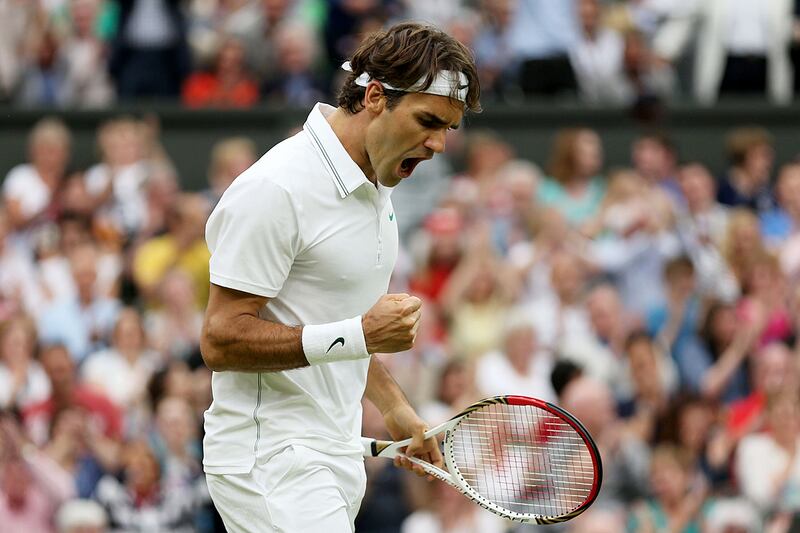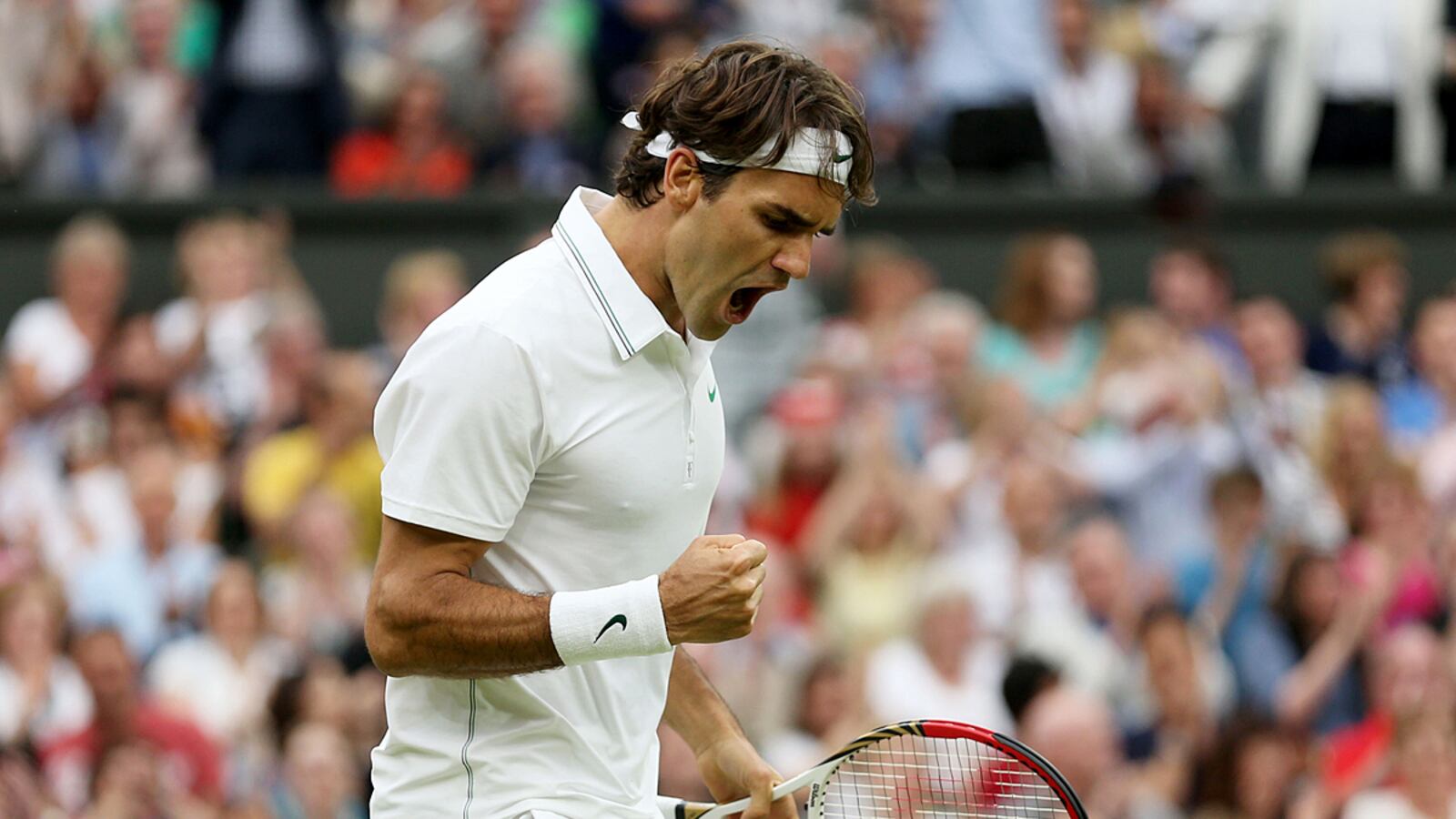Roger Federer is a tennis god. The 6-foot-1, 187-pound Swiss looks unassuming when he steps onto a court. He is, however, a fine-tuned machine who’s dominated the sport for the last decade—a monster on grass, hard court, and clay, and the winner of a record 16 Grand Slam titles. And he’s done all of it while barely breaking a sweat.
The equally off-putting and endearing thing about Federer is that he knows he's great. “I played fantastic,” he said nonchalantly in his suave accent, flashing his crooked smile after drubbing world No. 1 Novak Djokovic in the Wimbledon’s semifinal on Friday. And just like that, the 30-year-old maestro was poised to win his seventh championship on the historic grass and reclaim his ranking at the top of the sport.
It would be a great story of resurgence, a champion conquering his inner demons, vanquishing the new titans of tennis, and returning as the king of the court— if it were true. Yes, Federer is in decline. But when you fall from such great heights, it takes a while to hit the ground.
**
In the last two years, there have been Federer moments. Not the ones David Foster Wallace wrote about in The New York Times in 2006. These are less religious experiences, more excruciating ones.
They’re moments when a great tennis player is at the top of his game and poised to demolish anyone on any surface, then suddenly and inexplicably seems to lose interest in a match, dumping a lazy slice into the bottom of the net, or shanking a backhand into the first row. These moments come as he leads 40–love, and shatter his confidence. It’s as if Superman doubted whether he’d still be able to fly on take-off.
This happened in 2011’s French Open Final. Federer played intelligently, taking Rafael Nadal’s shots early, racing to a 5–2 lead against the Spaniard. Then Federer unraveled on his set point by dumping a drop shot wide. The match was done.
These Federer moments have come on the Grand Slam stage, where he once seemed unsinkable, and fit into the narrative that he would never win again. It may be because he knows he’s getting older and it’s unfathomable that he should be this good this late in his career. Or maybe with the birth of his twin girls in 2009, a few weeks after his last Wimbledon win, his priorities have realigned.
Since Federer’s first Grand Slam at Wimbledon in 2003, the trio of he, Nadal, and Djokovic have won a staggering 32 of 36 titles. And for most of that run, Federer was the best. He was a career-killer—ask one-hit wonder and former No. 1 Andy Roddick, who might have had nine Grand Slam titles in a Federer-less universe—uttering little more than the occasional “Come on!” after a big point, yet collapsing on court in tears after winning a tournament. His only Kryptonite was Nadal at the French Open.
Still, it’s been two and a half years since Federer’s lifted a championship trophy, and in the meantime Djokovic and Nadal have ascended to the top.

**
If we want to find the exact moment that Federer appeared human for the first time and reminded us that he wasn’t really a god but just a man with a tennis racket, it was after losing 2009’s Australian Open. In the 12 months prior to the match, Nadal had beaten him at the French Open and Wimbledon, stolen his no.1 ranking, and won Olympic gold at Beijing. The quest to hold the all-time Grand Slam record was derailed. Federer sobbed, reminding us of the tantrum-throwing, John McEnroe-esque brat he was as a kid. “God, it’s killing me,” he said.
But after that devastating loss, he won the French Open, Wimbledon, lost in the final of the U.S. Open, and then won the Australian Open. Not bad for someone in decline. The next two years weren’t much different.
A lung infection crippled him in the spring of 2010 season, and he was bumped from the quarters of Roland Garros and Wimbledon. Then he rattled off an impressive end to the season, trouncing Nadal and Djokovic.
The next year, 2011, was the first in nearly a decade Federer didn’t win a Grand Slam and wasn’t in the top three. He lost the French Open final to Nadal and a quarterfinal match at Wimbledon. And then there was the U.S. Open final, when Djokovic, facing match point, ripped a miraculous cross-court winner and taunted the crowd to get back on his side. Whether it was a lucky shot or not, the match was over for Federer. Despite this, he finished the year 17–0, winning three tournaments and bashing Nadal in the ATP Tour Finals.
This year was more of the same. In classic Federer style, in Australia and France, he botched early leads in semifinal matches against Nadal and Djokovic, and went home disappointed. He may not be winning the tournaments, but Federer is still there, a few points from beating the 25- and 26-year-olds ruling the sport.
What defines greatness in tennis? Djokovic had one of the most dominant seasons in history, but he has a ways to go. Nadal’s unbelievable run on clay and his 11 overall titles guarantee him a spot as one of the best ever.
Federer’s 16 titles, 285 weeks at No. 1, and consistency to advance to at least the quarterfinals of every Grand Slam tournament for eight years (which includes a mind-boggling 23-straight semifinals appearances) make him immortal. Given injuries, rising stars, declining warriors who refuse to quit, and simple “off days,” a streak like that just isn’t likely to happen again anytime soon. We’ve taken this for granted, which is why there’s a collective shock when someone seemingly invincible like Nadal bows out in the second round of a tournament.
When Federer lost in the semis of a major in 2008, he said that his unprecedented run had “created a monster.” At this year’s Wimbledon, he joked that his early exits in 2010 and 2011 weren’t a problem. “I went on vacation and relaxed,” he said. As Federer took Centre Court against Andy Murray in the championship match, he wasn't the same, invincible person he was years ago. But he still played spoiler to the hometown hero. And there won’t be a vacation this time. He’ll soon be hitting the grass again in London, striving for the one thing he still doesn’t have—an Olympic gold in singles.






